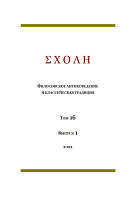РЕЛИГИОЗНАЯ ЭКУМЕНА ИМПЕРИИ В ВОЗЗРЕНИЯХ ЮЛИАНА ОТСТУПНИКА В КОНТЕКСТЕ ПРОЕКТА ВОССТАНОВЛЕНИЯ ИЕРУСАЛИМСКОГО ХРАМА
JULIAN THE APOSTATE'S INTERPRETATION OF THE RELIGIOUS ECUMENE OF THE EMPIRE IN THE CONTEXT OF THE PROJECT FOR THE RESTORATION OF THE JERUSALEM TEMPLE
Author(s): Roman SvetlovSubject(s): Jewish studies, Theology and Religion, Jewish Thought and Philosophy, Philosophy of Religion
Published by: Новосибирский государственный университет
Keywords: Julian the Apostate; paganism in the Roman Empire; chaldaism; neoplatonic theology;
Summary/Abstract: Julian the Apostate carried out his religious reforms, relying on the concept of religious piety, which he developed on the basis of the "Chaldean oracles" and contemporary Neoplatonism. His attempt to find a concordat with the Jewish communities fully fits into this concept. Having discovered the "Chaldean" origins of the religion of Abraham, Julian was able to include even the worship of Yahweh in the framework of neo-Platonic theology. The restoration of the Jerusalem temple was for him one of the elements of the renovation of divine-human communication. The lack of information about these events in medieval Jewish literature demonstrates that his attempt to include Judaism in the imperial religious ecumene was based on a misinterpretation of the Abrahamic type of religion.
Journal: ΣΧΟΛΗ. Философское антиковедение и классическая традиция
- Issue Year: XVI/2022
- Issue No: 1
- Page Range: 231-239
- Page Count: 9
- Language: Russian

